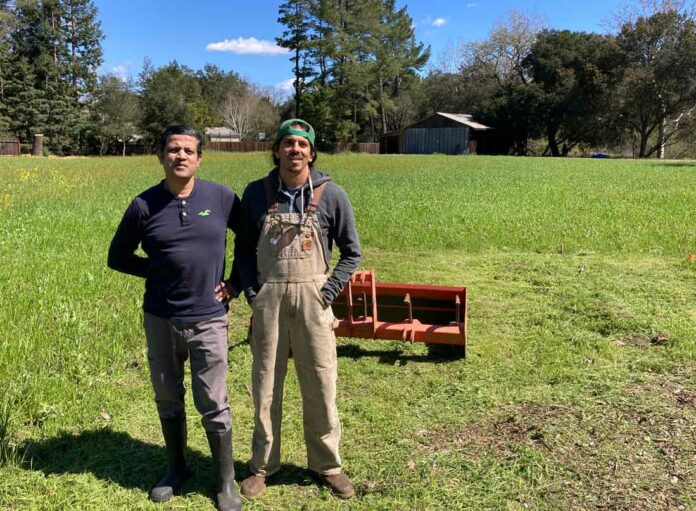
Like many growers in Santa Clara Valley, Dilip Sharma and Hektor Luis Calderon-Victoria are eager to plant rows of fruits, vegetables and other organic, commercial crops on their unincorporated Morgan Hill farmland as soon as the long, cold, wet winter finally comes to a close.
But unlike other farmers, Sharma and Calderon-Victoria will be planting their crops for the first time as owners and operators of their own agricultural business, known as Three Feathers Farm.
The duo established Three Feathers Farm in 2022 on a five-acre plot on Watsonville Road, about four miles southwest of downtown Morgan Hill. Their land is part of the original Muwekma Ohlone Tribe’s home, according to the farm’s website, but it hasn’t been farmed since the 1980s.
Sharma said since purchasing the site last year, he and Calderon-Victoria have been in the process of “healing” the land by planting nutrient-rich cover crops and pledging to practice sustainable agriculture techniques.
“At Three Feathers Farm, we believe in sustainable and ethical farming practices,” Sharma said. “We use only organic and non-GMO seeds, and our farming techniques are designed to promote soil health, biodiversity and conservation of natural resources. We believe that this approach not only benefits our customers, who receive high-quality, nutritious food, but also our local environment.”
As BIPOC farm operators—Calderon-Victoria is Latino of Mexican descent and Sharma is Indian—they plan to grow crops that are “culturally appropriate” for the communities they identify with throughout the South Bay. Crops they will be growing this year include bunching onions, carrots, corn, cucumber, garlic, okra, spinach, luffa gourd, greens mixes, herbs, lettuce mix, peppers, radish and squash, according to Sharma.
When they begin harvesting these crops, Three Feathers Farm plans to sell their fresh produce at local farmers markets as well as independent grocery stores and restaurants in the region—and likely at a farm stand they plan to set up on the side of Watsonville Road next to their property. Sharma said they will consider implementing a Community Supported Agriculture program for households to sign up for weekly or monthly fresh produce boxes.
Calderon-Victoria, a Santa Cruz resident, said Three Feathers’ crop list intends to meet a need in the market that is not widely focused on by other commercial farmers. With a full-time job as an agricultural policy advocate, Calderon-Victoria has been farming “up and down all of California” for about the last 8.5 years for other producers, most of them BIPOC farm operators.
“There are not many BIPOC farmers in the area who are trying to grow culturally appropriate produce,” Calderon-Victoria said recently at Three Feathers Farm. “And there are not many (producers) that grow organic. We want to be able to practice that niche and grow the food for the communities we identify with.”
They also aim to “make organic more affordable for these communities,” Calderon-Victoria said.
Three Feathers Farm will be Calderon-Victoria’s first operation where he’ll be farming as an owner.
Sharma, a Union City resident, is still busy with his career in the tech industry. He comes from a family of farmers in India, where he immigrated from, and he hopes one day that Three Feathers Farm will be part of his “legacy” that future generations will remember him for.
“We’re trying to transition into farming because there is a value system we want to build into our next generation,” Sharma said.
The Three Feathers Farm operators said they chose the Watsonville Road site because it is drenched in the well-known history of Santa Clara Valley’s famously fertile soil. They consider themselves “stewards” of the property whose ultimate goal is to care for the land and prolong its health, much like the Native American society that first farmed the site and its surroundings many generations ago.
“Indigenous people were stewards (of this land) before us. We are occupying it,” Calderon-Victoria said.
Along the way, as their crops fill the property and harvests grow more plentiful, they also hope to offer resources and knowledge to make it easier for future beginning farmers like themselves to become successful at growing produce.
The agricultural industry is filled with obstacles and challenges for people—and especially people of color—who want to get into farming for the first time. Available public resources are almost always directed toward larger, established commercial farms, Sharma explained. Not to mention, the price of land is prohibitive for the typical beginning farmer who isn’t starting out with a pile of capital, Calderon-Victoria added.
In the future, Three Feathers Farm plans to offer educational programs and farm tours for school groups, families and other interested people, Sharma said.
To help start Three Feathers Farm, they sought and received a grant from Sustainable Agriculture Research and Education. To obtain the grant, they pledged to record and present their observations and experiences building Three Feathers Farm in a way that will be useful to future BIPOC and beginning farmers. That includes a video series on Youtube and social media, and an upcoming “field day” at their Morgan Hill farm.
“We want to provide a blueprint for other (people) who want to get into farming: these are the steps you want to follow, these are the agencies you want to talk to” and so forth, Sharma said. “Because the next generation is going to face the same challenges.”
Calderon-Victoria added that farming works best when producers help each other.
“Farming is really about creating a community around it, to be supportive of one another—not just growing for yourself,” he said.
For more information, visit Three Feathers Farm’s website at 3feathers.farm.







